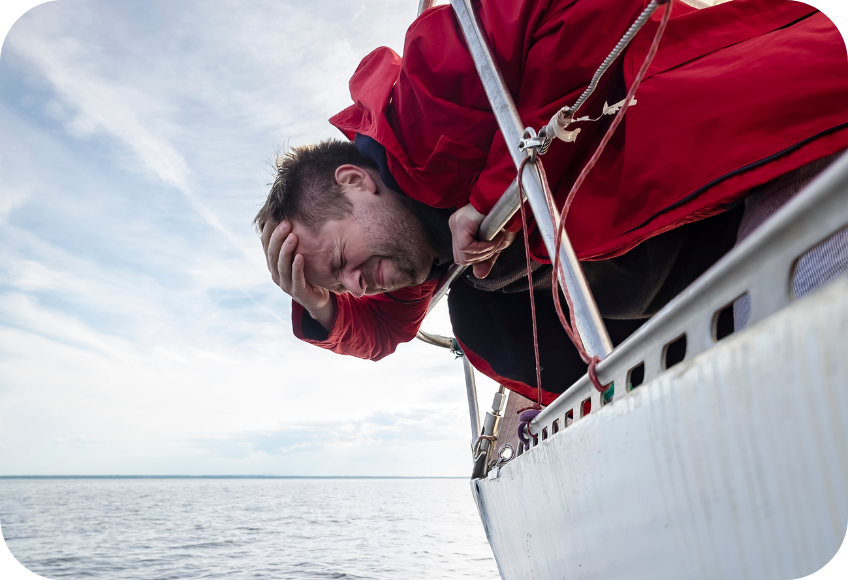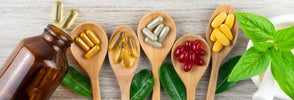
Histamine intolerance and seasickness
Do you know that: you are on a ship and after a short time you feel bad because you don't tolerate the waves? These symptoms are also called seasickness.
👉🏼 Sea health, also referred to as "kinetosis", is a physical reaction to contradictory movement stimuli and can become agony for many people. Sea health is particularly problematic for people who also suffer from histamine intolerance, as they can obviously make the symptoms worse. But how exactly are these two phenomena related?
💡 In this article we dive deeply into the mechanisms of seasickness and the role of histamine to answer this question ...
Share information about your brand with your Customers. Describe A Product, Make Announcements, Or Welcome Customers to your Store.
What is seasickness?
Sea abandality is a kind of travel sickness that is triggered by contradictory signals from different sensory organs. On a fluctuating ship, your eyes report a different movement than your sense of balance in the inner ear actually perceives. Your brain tries to process these incongruent information, which leads to a so -called "sense of meaning". There are often unpleasant symptoms such as dizziness, nausea and headache - even vomiting in severe cases. How much seasickness meets you depends on various factors: on the one hand on the type of movement. Slow, wave -shaped movements, such as those occurring at Seegang, are usually particularly intense. On the other hand, your mental state and personal sensitivity also play a role. People who react particularly sensitively to movements are more affected.
Share information about your brand with your Customers. Describe A Product, Make Announcements, Or Welcome Customers to your Store.
The connection between histamine and seasickness
Recent studies indicate that chemical processes in the body also play a role in all of this, especially histamine. This is a biogenic amin that acts as an important messenger in our body - both in the brain as a neurotransmitter and in the immune system as a mediator. The connection between histamine and seasickness: Studies show that the typical symptoms of seasickness, such as nausea and dizziness, are reinforced by increasing histamine in the body. Why does that happen? If our brain receives contradictory signals from the sense of balance and the eyes, for example when swinging a ship, it interprets this "confusion" as stress. And a frequent reaction of the body to stress is an increased histamine release.
If you suffer from histamine intolerance anyway, this reaction can become a real challenge. Your body then has difficulty reducing the excess histamine quickly. Instead, it remains in the system, which worsens nausea and dizziness. Histamine also plays a role in the brain's "breaking center". In people who are particularly sensitive to ship movements, the histamine release could exhilarate this center. This explains why antihistamines often help against seasickness: they block the histamine receptors and thus suppress nausea.
Share information about your brand with your Customers. Describe A Product, Make Announcements, Or Welcome Customers to your Store.
Sensory conflicts in seasickness
In the case of seasickness, there are different types of conflicts of sensory, which can be roughly divided into two main categories:
👁️ Category A: Visual and vestibular conflicts
This creates contradictions between what the eye sees and what the sense of balance in the inner ear. For example, if you are on a fluctuating ship and read a book, your eyes grasp the sides as calm while your body feels the swing movement of the ship. Simulators or certain film trips appear similar: your body remains static, but your eyes experience a movement - a typical trigger for dizziness and nausea.
👨🏼 Category B: Conflicts between the organs and Otolithen organs
This type refers to contradictory signals within the equilibrium organ itself. The arches and the otoliths register different movements, for example by tilting or turning the head in a certain direction. Such movements occur, for example, when you turn on a swivel chair and then move your head to the side, which triggers nausea in some people. Incidentally, this type is also responsible for the “space disease” in weightlessness, since there is no clear reference point for gravity.
These conflicts of sensory not only affect the feeling of nausea, but can also increase the histamine levels.
Share information about your brand with your Customers. Describe A Product, Make Announcements, Or Welcome Customers to your Store.
Treatment and prevention: vitamin C as a natural antihistamine
If you tend to seasickness, vitamin C could be a way for you if you are sensitive to histamine. Vitamin C acts as a co-factor for the enzyme diaminoxidase (DAO), which builds the histamine in the body. If the DAO activity is increased by more vitamin C, it is possible that less excess histamine remains in the blood. Less histamine could also mean that your symptoms are reduced in the event of seasickness, such as nausea and dizziness.
Studies on vitamin C against seasickness:
In order to find out how well vitamin C work against seasickness, researchers have carried out various studies on sailing ships and other challenging conditions. In a placebo-controlled double-blind study on a sailing ship, there was a slight improvement in the test subjects who took vitamin C chewing tablets. These subjects reported less nausea and dizziness than those who received a placebo. A further examination of the German Navy on board a rescue island under real sea conditions also confirmed the positive effects of vitamin C.
⛵ Sea gum - the chewing gum against seasickness
On the basis of these results, the “Sea Gum” was developed, a chewing gum with a high dose of vitamin C, which is specially intended for relieving seasy patients. The advantage is that vitamin C is quickly absorbed via the oral mucosa and can therefore work faster than tablets that only have to be through the digestive tract. If you start to chew the chewing gum at first signs of nausea, it could offer faster relief and help you keep the symptoms in check.
Vitamin C could therefore prove to be an effective means of relieving the symptoms in the event of seasickness. Especially with the “Sea Gum”, if you suffer from a histamine intolerance, you should make sure that there are no incompatible additives for you. If in doubt, prefer to use pure, highly doseed vitamin C.
If you feel slightly sick at sea or you are sensitive to histamine, there are a few tricks and means that can help you feel more comfortable. In addition to vitamin C, you can do a lot to get the seasickness under control:
1. Histamine nutrition
Try to do without Histamine -rich foods before and during your trip and make no exceptions.
2. Antihistamines - take in time
Travel chewing gums such as traveling or tablets such as Superpep contain antihistamines. They block the histamine receptors and alleviate nausea. Important: You should take them preventively because they don't work immediately. So better think about it before boarding. Also pay attention to ingredients and discuss in advance with your doctor whether this can be a compatible opportunity for you.
3. Scopolamine plaster
A small plaster behind the ear can work wonders. Scopolamine calms your equilibrium system and thus prevents the clever feeling. But be careful: some people become sleepy or see blurry. It is best to test it beforehand when you are unsure.
4. The correct position on board
The place makes a difference! In the middle of the ship you feel the least. Even better: Find a place where you have the horizon in view - that helps your sense of balance to adapt better.
5. Vegetable helpers - ginger
Ginger is a real classic against nausea. Whether as a tea, capsule or in a candied form - it calms the stomach and can also be of great help at sea. But be careful - with histamine intolerance, ginger may not be compatible for you!
Share information about your brand with your Customers. Describe A Product, Make Announcements, Or Welcome Customers to your Store.
Image with text
ADVERTISING
Effective histamine management
Histabalance® Basics combines important vitamins, antioxidants and mineralsthat the body needs with a low -histamine diet.
The Basics Formula with Calcium, vitamin C, magnesium, quercetin and copper is an important building block with a low -histamine diet.
Histabalance® Basics supports you and contributes to it through the included copper, which To protect cells from oxidative stress.
to the product
Diet and its influence on the sense of balance
Your diet also has a greater impact on the sense of balance than you may think. The balance is mainly controlled by the inner ear, more precisely from the so -called vestibular apparatus. If disorders occur here, the dizziness can trigger - and your diet often plays a role. Foods such as heavily salt -containing dishes can influence the liquid pressure in the inner ear and increase symptoms such as swindling of the shoot. A low -salt diet is therefore recommended, especially for diseases such as Menière's disease to reduce such attacks. At the same time, it is important to drink enough water, because dehydration can also cause equilibrium disorders. Certain nutrients also have a direct or indirect effect on your sense of balance. Vitamins of the B group, vitamin D and magnesium are important for the nervous system and thus for the balance. A lack of this fabrics can cause you to feel unstable or feel dizziness more often. Antioxidants that you find in fruit and vegetables also protect the nerve cells from damage and inflammation, which is particularly helpful for sensitive inner ears. Alcohol, caffeine or sugar -containing foods can mess up the sense of balance by disturbing the fluid balance or letting the blood sugar level fluctuate heavily. Good to know: A polluted liver can also provide dizziness - so it is worth paying attention to a balanced diet and avoiding unhealthy food.
The right nutrition can be an important building block to support your sense of balance. Fresh, full -fledged foods, sufficient liquid and a conscious selection of salt and sugar can help you feel more stable and are less susceptible to dizziness.
Share information about your brand with your Customers. Describe A Product, Make Announcements, Or Welcome Customers to your Store.
Collapsible content
SOURCES
- Book by Prof. Reinhart Jarisch: "Histamine intolerance"
- https://www.aerzteblatt.de/archiv/201454/See-und-Reisekrankheit
- https://www.maritimemedizin.de/maritime-medizin/wissenschaftliche-projekte.html
- https://www.amplifon.com/de/amplifon-blog/diaet-gegen-schwindel
- https://link.springer.com/article/10.1007/s00115-024-01678-6

From those affected for those affected
We are Thomas and Michaela Zinser, founder of Histaminikus.
Because of the own histamine intolerance of Michaela and our son, we founded Histaminikus. The frustration does not find any suitable histamine food has spurred us to develop low -histamine food.
We would like to give you back a piece of quality of life. Feel free to look around with us.
Kind regards
Thomas and Michaela







